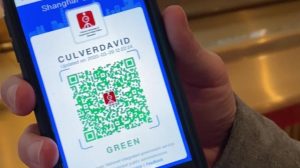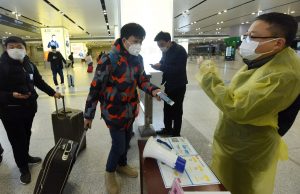Is the health QR Code really healthy?
By Joanna Wang | May 29, 2020
The magical tool for a peace of mind
Imagine this scenario: You’ve read about the covid-19 outbreak on the news and learned that it is a very contagious virus. You thought about the people coughing on the subway, a coworker that was under the weather but still showed up at work and some random person that sneezed on the street but didn’t cover their month. You are worried about your own health and constantly asking “am I exposed to the virus?” “Did people near me got the virus?” The fear is real, and I have experienced it first-hand. Wouldn’t it be great if there is a tool to find out these questions and have real time update? Won’t you want the get an alert if someone you have been in close contact got diagnosed for covid? This has been done in China already. A digital QR code: a magical tool for a peace of mind.
How does the QR code work
Citizens have to fill in their personal information to obtain a QR health code on their smartphone. Citizens need to provide their name, national identity number or passport number, phone number, travel history, any Covid symptoms, any contact with confirmed or suspected Covid-19 patients in the past 14 days. After the information is verified by authorities, each user will be assigned a QR code in red (need quarantine for 14 days), amber (need quarantine for 7 days) or green (free to move). Citizens will need to scan their QR code every time they enter a public facility: restaurants, subway stations, workplaces, shopping malls and so on. Once a confirmed case is diagnosed, authorities are able to quickly backtrack where the patient has been and identify people who have been in contact with that individual. People now can feel safer from Covid, so problem solved! But is it really?

Figure 1: A hand holding a cellphone
The lingering helper
With the help of health QR code, China was able to quickly contain the outbreak and reopened the economy. However, the health QR code will not fade away. Instead, it will turn into something more advanced or even invasive: it will give the user a 0-to-100 score based on how healthy their lifestyles are, for example how much they sleep, how many steps they take, how much they smoke and drink and other unspecified metrics. Thoughtful or creepy?
The concerns
Desperate time for desperate measure, we get it. Just like most of the technology, the intension of creating health tracking QR code is good (I hope so. Although people can disagree on the intention part). The government is trying everything they can to protect people from Covid-19, but at the same time, privacy is sacrificed. The QR code collect people’s location, who they have contacted and other rather private information. Maybe under extreme circumstances like Covid-19 outbreak, people are willing to sacrifice some privacy in exchange for safety. That still doesn’t make this whole collecting citizen information thing ethical. Furthermore, the “Dividing people into colors” method leads to people getting discriminated and not to mention the false positive results that the app generate (users got flagged for Red for no obvious reasons). The health QR code feels like a step closer to a scoring system for citizens. People’s movement, lifestyles should not be the governments concern and certainly should not be used to put people into categories. If the heath QR code further evolve and start collecting people’s medical record, how do we make sure the app development company has the necessary measures to protect user data? And how will these data be used for or against the users? If the QR code is required to enter public facilities, what about people who don’t want to use the code? These are all very sensitive questions that we need to address before we turn the health QR code into a civilian spy.

Figure 2: A group of people standing around a luggage carousel at an airport
Reference
https://www.cnn.com/2020/04/15/asia/china-coronavirus-qr-code-intl-hnk/index.html
